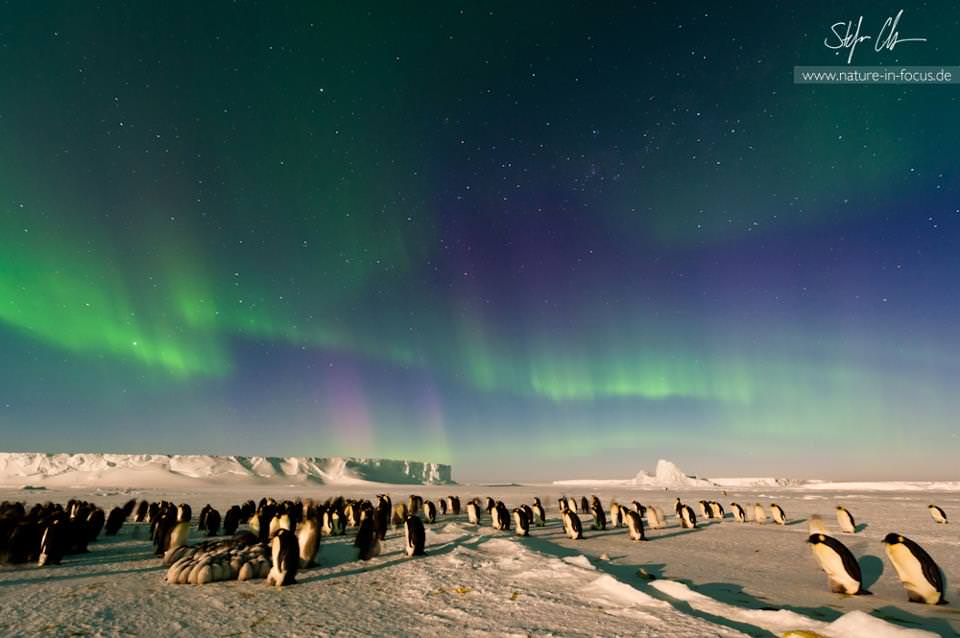Emperor Penguins on the Antarctic Sea Ice Under the Aurora Australis. Credit and copyright: Stefan Christmann. Used by permission.
Photographer Stefan Christmann called this incredible Antarctic view a once in a lifetime experience.
“It was the most impressive experience to sit on the sea-ice and watch the Aurora Australis dance above the penguin colony with the sounds of the chicks and the adult penguins. I feel truly blessed for having had the opportunity to witness this once in a lifetime experience,” he told Universe Today.
Christmann is currently based in Antarctica, working at the German Antarctic research station Neumayer III. He is an “overwinterer” — scientific and technical staff who stay at the base for the entire southern winter — and will stay in Antarctica for an uninterrupted 14 months. “As a physicist, my duty is to maintain the data acquisition of our seismological and geomagnetic observatories as well as the analysis of the collected data,” Christmann said.
But he is also an accomplished photographer. His website and Facebook page are filled with beautiful nature images from around the world, and recently feature the Emperor penguins and their adorable chicks, as well as the stark beauty of the Antarctic landscape.
Originally from Germany, he studied photography in the US, and his work has now brought him to an extended stay in Antarctica.
Christmann explained the conditions and the difficulties in obtaining this shot, one he had long hoped for, the planning of it always in the back of his mind.
“The picture was taken at Atka-Bay on the sea-ice. The bay is roughly 8 km away from our station so the penguin colony is a popular destination for free-time trips. The idea of a photo of the Aurora Australis above the penguin colony had been in my head for a long time, but the conditions have to be just right –which usually never happens. You need a full Moon, high magnetic activity and a cloudless sky. Also the penguins should be standing close enough to the ice-berg. I made multiple attempts to get the photo, but we either had incoming clouds, low activity or had to cancel our stay because of wind picking up (which can be really dangerous out on the sea-ice).”
And time was short, as after he had been outside for a few hours the wind picked up and he and his accomplices had to leave the ice for safety reasons. “Otherwise we probably would have sat there all night!” Christmann said. The image was taken on October 1, 2012.
Christmann shared what equipment he uses as well as a few tips for Antarctic and cold weather photography.
“I used a Nikon D700 Fullframe DSLR with an AF-S G-Nikkor 14-24mm f/2.8. ISO settings varied with the intensity of the aurora from ISO 500-800,” he said. “F-Stops in the range of 4.0-5.6 and Exposure times from 20s to 30s. I try to keep ISO as low as possible for noise reasons and also try to limit the exposure time in order not to get star trails. It’s either super long star trails or almost star-dots, but I don’t really like the in between. A full battery charge (in my case around 2500mAh) lasts around 1h in the cold, so I had to switch batteries twice during our stay out on the ice!”
Asked what other details he felt was important to share about this image, Christmann said, “Antarctica is an incredible place where nature dwarfs anything made by humans. Hopefully people will gain even more interest in this continent and help to protect it as well as its inhabitants.”
To see more of Christmann’s work visit his website, Nature in Focus or his Facebook page, where he shares many pictures of his Antarctic adventure.
Please note: This image may not be re-posted, used or copied without the express permission of Stefan Christmann.

